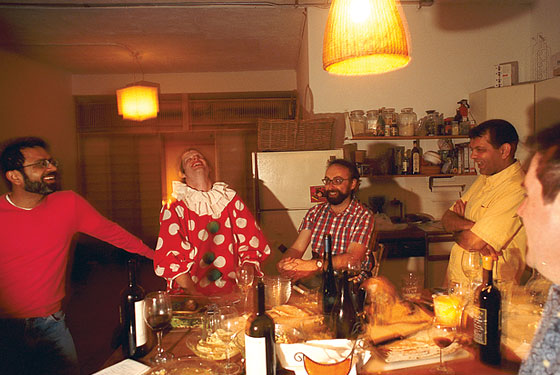
The evening’s first bottle of wine isn’t even empty, and John Wray—one of five writers in this Boerum Hill kitchen—is already breaking out his expert impression of rats copulating. It’s a rhythmic squealing he’s intimately familiar with from the time he spent living rent-free in a Dumbo storage room for band equipment, writing what would become his acclaimed novel, The Right Hand of Sleep, after the bands finished rehearsal around 2 a.m. There was no bathroom or kitchen, and dating was difficult, but “it was crucial to have girlfriends because otherwise I would never have bathed.”
Life has improved somewhat for Wray, 35, as well as for the four other writers who attend this generally monthly dinner party. The Right Hand of Sleep won him the emerging writer’s holy grail, a Whiting Award, and Wray, Gary Shteyngart, and Akhil Sharma were all recently included among Granta’s best Young American Novelists. The evening’s host, Suketu Mehta, 43, was a Pulitzer finalist for his nonfiction Bombay chronicle Maximum City. Ray Isle, a 44-year-old editor at Food and Wine, is the only writer here without a published book, but he brings something very valuable to the table—all the wine the boys can drink.
“Akhil is the architect of this group,” Wray says. “He made his own lost generation.” Isle seconds: “He’s sort of like our Gertrude Stein, but straight, Indian, male.” While still working as an investment banker, Sharma, now 35, published his acclaimed first novel, An Obedient Father, the eerily detached story of a corrupt Indian official who slept with his daughter. He knew Isle and befriended the others at readings and events.
There is more than a touch of the support group to this circle—which is odd, because you wouldn’t think they’d need one. But these writers occupy an anxious middle zone. No longer desperate for approval, they still can’t survive off their books (and Sharma has quit banking). Reviews and awards don’t translate into sales, and the incessant touring is a grind. Wray’s arduous raft journey down the Mississippi to promote his second novel, Canaan’s Tongue, was written up in the Times; according to BookScan, the book sold 1,300 copies in the States. And writing the thing “was a bitch,” says Wray, shaking his glass at Shteyngart. “Not this man! He wrote [Absurdistan] in his fucking bed for two years in Rome while being waited on by Slavic indentured servants.”
“When in Rome, yes,” says Shteyngart. “But it was still hard. Absurdistan was a major piece of shit and then Akhil turned it into slightly less of a piece of shit.”
Sharma does double duty as the group’s organizer and heartless editor. “There’s a bit of Elsa, She-Mistress of the SS, in Akhil,” says Wray. He read Mehta’s Bombay manuscript twice, back when it was 1,667 pages long.
Shteyngart, the luckiest of the lot (and the youngest, 34), is also the most wistful on that favorite subject—the Future of the Novel. “What Tony Soprano says about the Mafia, the same holds true for fiction: Things are trending downward these days.”
“The novel is dead, and I’m a necrophiliac,” Mehta adds.
“Actually, I think that’s bullshit,” says Wray. “I’ll pick up a biography of some far more gifted novelist of the thirties, and read about what he or she had to do to pay the rent, and I realize we’re in a very good situation.” The main difference, as he sees it, is that more American writers are read abroad now. “Thank God that other countries care about America. That’s what enables those of us who live off our writing.”
Playboy is another blessing. Wray is about to write the magazine an essay about reuniting with an ex-girlfriend; Shteyngart has already done a version of that Playboy staple. “My last agent told me not to write for Playboy because it would turn off my female readers,” says Mehta. “But my female readers don’t pay me seven bucks a word.”
With the sixth and last bottle of wine half gone, the conversations begin to atomize. Sharma sidles up and begins rattling off suggestions on how to make this story work. “What you need is gravity, a weighty thing. Like, Suketu’s wife left him, and he couldn’t sleep at night. You have to press the wound. Talk to Ray about money, because he has a kid. Something painful. That’s where you get the emotion, the humanity.”
Wait, is this the kind of stuff their support group usually talks about?
“Well, at one point, we all did talk about who was the hairiest,” says Sharma. “Shockingly enough, John is a mess.”
But this is not a night for painful revelations (aside from Shteyngart’s announcement that he was circumcised at age 12). They make revelations for a living, after all, and right now, they’re off the clock. Instead, it’s a rare occasion to toast writerly friendship, without which New York’s authors might not make it at all. “I don’t have a lot of writer friends,” insists Shteyngart. “I don’t care about other writers.” Mehta, clearly capable of finding 1,667 pages’ worth to say about one city, responds with uncharacteristic concision: “New York is a city of tribes. The only way to survive is if you have your own tribe. And this is ours.”
